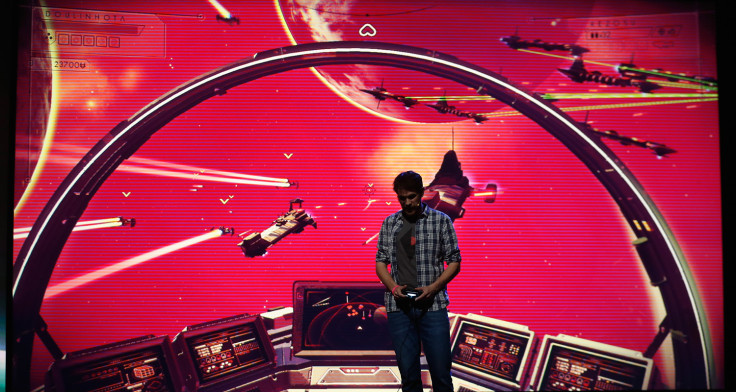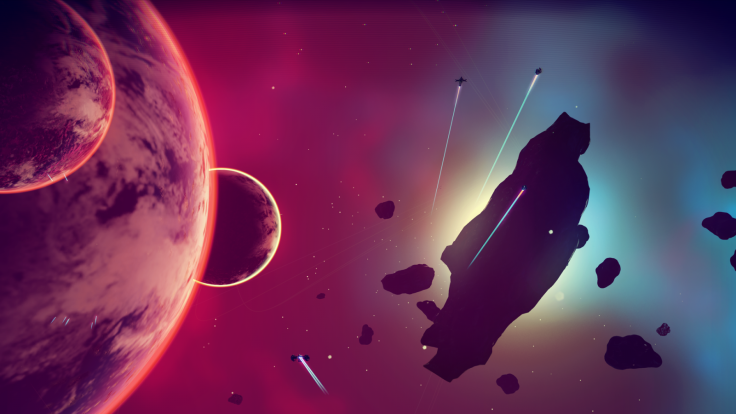Sky's the Limit: How No Man's Sky has revolutionised indie development forever
With an entire universe to explore, the PS4 and PC game might be indie gaming's greatest achievement.
When one of the largest games websites on the planet dedicates an entire article to the quality of your facial hair, you know you've made it. For Sean Murray – managing director at Hello Games – the idea that the growth of his beard while developing No Man's Sky would generate column inches would have seemed fanciful when he first conceived the game four years ago.
No Man's Sky, however, is currently the talk of the town, serving as a major feather in PlayStation 4's cap as it looks to hold off Xbox One's renewed assault.
What makes No Man's Sky's status as Sony's latest system seller all the more interesting, is the fact this isn't some big budget action-game from a major publisher. It's a comparatively niche (but incredibly ambitious) game of survival from an indie outfit based in Guildford, 30 miles outside of London.
Anyone who likes a bet, wouldn't have put money on a studio of less than 20 staff having such a major role in the battle between the top two consoles.
That's not to say No Man's Sky is the first indie title this generation to generate a large amount of interest. At a time when the majority of killer-apps from major publishers tend to launch across both PlayStation and Xbox, the platform perceived to have the most indie support has a valuable, if only slight, edge. However, what makes Hello Games' latest somewhat unique is that, in the 26 months since the game was revealed at VGX 2013, No Man's Sky has been able to build up a level of hype comparative to the biggest IPs.
Pinning down just why No Man's Sky has been able to break through this particular glass ceiling is a tricky science. Much of the excitement undoubtedly stemmed from the game's announcement trailer over two years ago. Though little was known about just what form No Man's Sky's brand of planetary exploration would take; its crisp, clean and refined visuals set it apart from the rush of typically shiny first generation titles on the new systems.

A prized billing at Sony's E3 2014 event also boosted the game's profile above the norm, and Sony's backing has, by Hello Games' own admission, been key to its progression.
"Sony has been super cool to work with, but mainly just because they haven't been involved in development," Murray offered in a Reddit Q&A. "We're still sort of the underdog with Sony, and in the general AAA, for obvious reasons."
In turn, Shahid Ahmad – the man who, during his time at Sony, helped cement the giant's relationship with No Man's Sky – said Hello Games itself broke down boundaries by even considering working with the Japanese giant. "It's hard to imagine now, but at the time, for Hello Games to trust me, and PlayStation, was the biggest risk any developer has ever taken," he tweeted. "People will of course see the game and judge everything that's happened accordingly, but to get to this point at all was a miracle."
Arguably more interesting than how No Man's Sky achieved its heralded status however, is the impact it will have in the future – on Hello Games itself, but also on the nature of indie development in the modern era. The prospect of small studios being able to command the attention of the world in the same way as EA, Activision or Ubisoft is now entirely possible, but with that raised profile comes a whole heap of responsibility, as Murray himself has acknowledged.
"Obviously the hype is terrifying," he continued on Reddit. "I mean, I have had this hanging over me for three years since we announced. It's catch 22. If we hadn't announced when we did, we probably would have quit the project without the community supporting us, but God, should I have passed up [demoing the game on The Late Show With Stephen] Colbert? Or E3? I dunno."

Hype breeds hype, and appearances on huge mainstream shows like The Late Show are opportunities rarely afforded to outfits the size of Hello Games. Murray is fully aware of the pros and cons of entertaining such a high profile platform. "Every time we showed the game we always assumed people would suddenly not like it anymore, but instead the hype would just get crazier. If [No Man's Sky] is a success, I think that probably will have a real impact in terms of how a lot of people in larger publishers view indie games. People generally think of [No Man's Sky] as a Sony title, but we're still just a self-funded indie studio – it's kind of a crazy situation."
This is the double edged sword Hello Games – and all who attempt to follow – will have to contend with. While the studio's indie status enabled it to garner much favour with the press in the run up to its release, gamers paying out $50 (£38.5) or more for No Man's Sky will have little patience for Hello Games' enormous size if the gameplay doesn't meet their expectations.
Indeed, the impression people already have that No Man's Sky's procedurally generated universe (one it's claimed would take 584 billion years to fully explore) takes some time to get into its stride, may prove off putting for casual gamers. Likewise, the fact the game is largely a solo experience, with fellow players unlikely to encounter each other even if they're on the same planet, has generated a mini backlash already. The hype has put Hello Games under a microscope like few other studios.
Nevertheless, the sea change in how indie games are perceived, triggered by No Man's Sky, should not be underestimated. Hello Games has managed to push out one of the most anticipated games of 2016 not in spite of being an indie studio, but because it's an indie studio. Expectations of just what a small outfit can achieve on the high-powered consoles sat under our TV sets have well and truly been raised.
The game for indies has changed forever. Life for them is about to get as hairy as Sean Murray's beard.
For all the latest video game news follow us on Twitter @IBTGamesUK
© Copyright IBTimes 2025. All rights reserved.






















